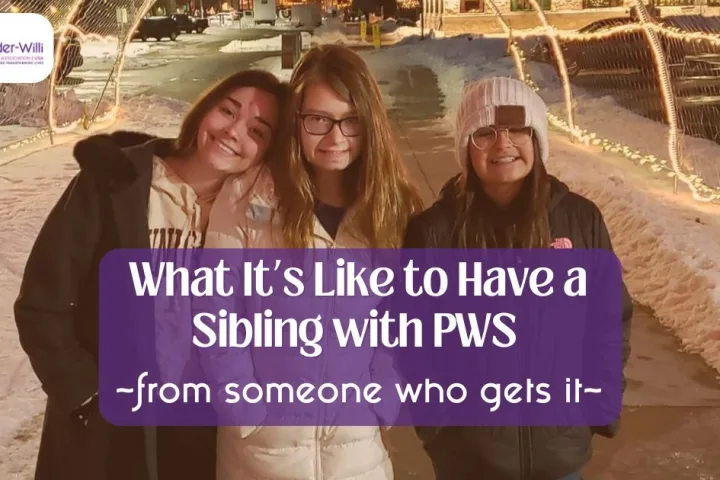Sibling relationships can sometimes be the most challenging, and the most rewarding. Introduce a sibling with PWS, and this spectrum often becomes even more extreme. The friction and conflict may be far more frequent and difficult to manage, but the connections and support may be far sweeter. So how do we navigate these relationships? How do we help our children be good siblings to each other when PWS is present? As the mother of a 12-year-old with PWS who has a sibling only 16 ½ months younger, I have a vested interest in this topic.
I wish this were a topic we could easily break down, that I could create a bulleted PDF checklist of things to do and not do when helping your loved ones navigate their sometimes-complicated sibling relationships. I wish I had one for my own children. The reality is that each situation will be different, with varying personalities, needs, experiences, and challenges distinct to families.
What we can do is listen to the experiences of other families and gain insight from what they share, taking what we will and leaving what doesn’t fit into our lives. To this end, I sought the help of PWSA | USA’s Parent Support Coordinator, Kristi Rickenbach. She shared her experience as the mother of five children, one of whom has PWS. The following is advice and insight that I gleaned from our discussion.
Make accommodations to make things possible
The reality is that our loved ones with PWS may not be able to do all the things their siblings get to do, whether from a disability, lack of food security, safety concerns, etc., but we can make accommodations to make things possible. Remember that there are people all over the world who can’t do certain things, so they find different ways to do them. Adapt and accommodate when possible.
Be matter of fact
It may be difficult for parents to discuss PWS with their loved ones. We may feel the need to protect them from some of the scarier stories of PWS, but the reality is that they live with PWS and will always live with it. There is power and safety in knowledge.
It is important for our loved ones to understand themselves and what their needs are. Sometimes that looks like not doing what their sibling does. It is also important to remember that their sibling’s needs are also important. It may be challenging but necessary to find that balance in your household.
For example, if your child learns early on that all bodies are different and have different needs, it can be a healthier household when they know their sibling may need to eat more than they do. We encourage families to shy away from expecting the sibling to eat in secret as that can be a strong precursor to eating disorders. This, of course, will not work for every family, and finding that balance of needs will vary depending on hyperphagia and emotional dysregulation concerns.
Have the hard conversations (with loved one and sibling)
Along the lines of being matter-of-fact with your loved one with PWS, include their sibling in those conversations. Be sure they have the necessary and appropriate information to be a safe and effective support. Talk with them about the challenges of having a sibling with PWS and be a person they can come to with questions or concerns. If you can’t be that person (and that’s okay if you can’t!), help them find a family member, family friend, or professional that they can talk with.
Celebrate
Some sibling successes may be difficult for our loved ones. For example, most people with PWS will not get a driver’s license and may have negative feelings about their sibling getting theirs. It is important that the siblings are able to share their happy and positive experiences. It is also a good lesson for our loved ones to accept that their siblings deserve to share these experiences. It may also be important for your sibling to understand that while they should share their happy experiences, they should not dwell on that in front of the loved one with PWS.
The world is how it is and, though our loved ones receive many accommodations, we encourage them to learn to adapt. Those accommodations may not always be present. We can’t expect our siblings to always be the one meeting the individual with PWS, but of course, this again varies case by case and family to family. Some individuals with PWS will be able to meet their sibling most of the way, and many others will need their sibling to come closer to them. Finding the balance that works for your family is important.
Mitigate the negative with the positive – Reframe it!
A valuable lesson is the idea that we get to choose to be happy. Now, some situations may make this more challenging, but generally, it can bring incredible mind shifts and change to a family. Rather than nurturing a mindset of some get more and certain things are valued more than others, try nurturing the idea in your family that there are many ways to be happy, many avenues to bring joy and delight into someone’s life. Reframe the narrative that life must look a certain way for people to be happy.
Your loved one with PWS is probably a great teacher at times. Rather than lamenting about what they can’t do or be involved in, make note of what they can and do enjoy doing. Encourage them and nurture the happiness they feel in certain things.
Share this!





 Jennifer Bolander has been serving as a Special Education Specialist for PWSA (USA) since October of 2015. She is a graduate of John Carroll University and lives in Ohio with her husband Brad and daughters Kate (17), and Sophia (13) who was born with PWS.
Jennifer Bolander has been serving as a Special Education Specialist for PWSA (USA) since October of 2015. She is a graduate of John Carroll University and lives in Ohio with her husband Brad and daughters Kate (17), and Sophia (13) who was born with PWS. Perry A. Zirkel has written more than 1,500 publications on various aspects of school law, with an emphasis on legal issues in special education. He writes a regular column for NAESP’s Principal magazine and NASP’s Communiqué newsletter, and he did so previously for Phi Delta Kappan and Teaching Exceptional Children.
Perry A. Zirkel has written more than 1,500 publications on various aspects of school law, with an emphasis on legal issues in special education. He writes a regular column for NAESP’s Principal magazine and NASP’s Communiqué newsletter, and he did so previously for Phi Delta Kappan and Teaching Exceptional Children. Evan has worked with the Prader-Willi Syndrome Association (USA) since 2007 primarily as a Crisis Intervention and Family Support Counselor. Evans works with parents and schools to foster strong collaborative relationships and appropriate educational environments for students with PWS.
Evan has worked with the Prader-Willi Syndrome Association (USA) since 2007 primarily as a Crisis Intervention and Family Support Counselor. Evans works with parents and schools to foster strong collaborative relationships and appropriate educational environments for students with PWS. Dr. Amy McTighe is the PWS Program Manager and Inpatient Teacher at the Center for Prader-Willi Syndrome at the Children’s Institute of Pittsburgh. She graduated from Duquesne University receiving her Bachelor’s and Master’s degree in Education with a focus on elementary education, special education, and language arts.
Dr. Amy McTighe is the PWS Program Manager and Inpatient Teacher at the Center for Prader-Willi Syndrome at the Children’s Institute of Pittsburgh. She graduated from Duquesne University receiving her Bachelor’s and Master’s degree in Education with a focus on elementary education, special education, and language arts. Staci Zimmerman works for Prader-Willi Syndrome Association of Colorado as an Individualized Education Program (IEP) consultant. Staci collaborates with the PWS multi-disciplinary clinic at the Children’s Hospital in Denver supporting families and school districts around the United States with their child’s Individual Educational Plan.
Staci Zimmerman works for Prader-Willi Syndrome Association of Colorado as an Individualized Education Program (IEP) consultant. Staci collaborates with the PWS multi-disciplinary clinic at the Children’s Hospital in Denver supporting families and school districts around the United States with their child’s Individual Educational Plan. Founded in 2001, SDLC is a non-profit legal services organization dedicated to protecting and advancing the legal rights of people with disabilities throughout the South. It partners with the Southern Poverty Law Center, Protection and Advocacy (P&A) programs, Legal Services Corporations (LSC) and disability organizations on major, systemic disability rights issues involving the Individuals with Disabilities Education Act (IDEA), Americans with Disabilities Act (ADA), and the federal Medicaid Act. Recently in November 2014, Jim retired.
Founded in 2001, SDLC is a non-profit legal services organization dedicated to protecting and advancing the legal rights of people with disabilities throughout the South. It partners with the Southern Poverty Law Center, Protection and Advocacy (P&A) programs, Legal Services Corporations (LSC) and disability organizations on major, systemic disability rights issues involving the Individuals with Disabilities Education Act (IDEA), Americans with Disabilities Act (ADA), and the federal Medicaid Act. Recently in November 2014, Jim retired.